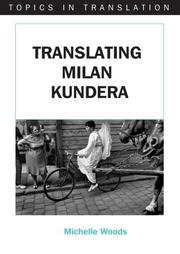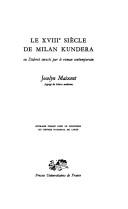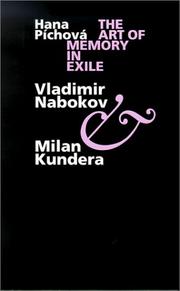| Listing 1 - 10 of 10 |
Sort by
|
Book
ISBN: 1612492479 9781612492476 9781612492483 1612492487 9781557536372 1557536376 Year: 2013 Publisher: West Lafayette, Indiana
Abstract | Keywords | Export | Availability | Bookmark
 Loading...
Loading...Choose an application
- Reference Manager
- EndNote
- RefWorks (Direct export to RefWorks)
"While a large amount of scholarship about Milan Kundera's work exists, in Liisa Steinby's opinion his work has not been studied within the context of (European) modernity as a sociohistorical and a cultural concept. Of course, he is considered to be a modernist writer (some call him even a postmodernist), but what the broader concept of modernity intellectually, historically, socially, and culturally means for him and how this is expressed in his texts has not been thoroughly examined. Steinby's book fills this vacuum by analyzing Kundera's novels from the viewpoint of his understanding of the existential problems in the culture of modernity. In addition, his relation to those modernist novelists from the first half of the twentieth century who are most important for him is scrutinized in detail. Steinby's Kundera and Modernity is intended for students of modernism in literary and (comparative) cultural studies, as well as those interested in European and Central European studies"--
Modernism (Literature) --- Existentialism in literature. --- Kundera, Milan --- Kountera, Milan --- Кундера, Милан --- קונדרה, מילן --- كوندرا، ميلان --- Criticism and interpretation. --- Europe --- Intellectual life --- 쿤데라, 밀란 --- クンデラ, ミラン
Book
ISBN: 9401208174 9789401208178 9789042035430 9042035439 Year: 2012 Volume: v. 252 Publisher: Amsterdam Editions Rodopi
Abstract | Keywords | Export | Availability | Bookmark
 Loading...
Loading...Choose an application
- Reference Manager
- EndNote
- RefWorks (Direct export to RefWorks)
Much of the debates in this book revolves around Milan Kundera and his 1984 essay “The Tragedy of Central Europe.” Kundera wrote his polemical text when the world was pregnant with imminent social and political change, yet that world was still far from realizing that we would enter the last decade of the twentieth century with the Soviet empire and its network of satellite states missing from the political mappages Kundera was challenged by Joseph Brodsky and György Konrád for allegedly excluding Russia from the symbolic space of Europe, something the great author deeply believes he never did. To what extent was Kundera right in assuming that, if to exist means to be present in the eyes of those we love, then Central Europe does not exist anymore, just as Western Europe as we knew it has stopped existing? What were the mental, cultural, and intellectual realities that lay beneath or behind his beautiful and graceful metaphors? Are we justified in rehabilitating political optimism at the beginning of the twenty-first century? Are we able to reconcile the divided memories of Eastern or Central Europe and Western Europe regarding what happened to the world in 1968? And where is Central Europe now?
Civilization. --- Politics and government. --- Barbarism --- Civilisation --- Auxiliary sciences of history --- Culture --- Kundera, Milan --- Kundera, Milan. --- Kountera, Milan --- Кундера, Милан --- קונדרה, מילן --- كوندرا، ميلان --- Criticism and interpretation. --- Since 1989 --- Heisei Period (Japan) --- Europe, Central --- Europe, Central. --- History. --- 쿤데라, 밀란 --- クンデラ, ミラン

ISBN: 1853598828 9781853598821 1853598836 9781853598838 9781853598845 1853598844 1280507772 9786610507771 9781847695468 1847695469 Year: 2006 Volume: 30 Publisher: Clevedon Multilingual Matters
Abstract | Keywords | Export | Availability | Bookmark
 Loading...
Loading...Choose an application
- Reference Manager
- EndNote
- RefWorks (Direct export to RefWorks)
Translating Milan Kundera uses new archival research to view the wider cultural scope of the translation issue involving the controversies surrounding Kundera’s translated novels. It focuses on the language of the novels, Kundera’s ‘lost’ works, writing as translation, interpretation, exile, censorship and the social responses to translated fiction in the Anglophone world.
Theory of literary translation --- Kundera, Milan --- Translating and interpreting. --- Translating and interpreting --- Slavic, Baltic and Albanian Languages & Literatures --- Languages & Literatures --- #KVHA:Toegepaste vertaalwetenschap --- #KVHA:Vertaling; Kundera --- Traduction et interprétation --- Translations --- History and criticism. --- Traduction et interprétation --- Interpretation and translation --- Interpreting and translating --- Language and languages --- Literature --- Translation and interpretation --- Translating --- Kountera, Milan --- Кундера, Милан --- קונדרה, מילן --- كوندرا، ميلان --- Translators --- Traducción e interpretación --- Kundera, Milán --- -Kountera, Milan --- Traducción --- -Historia y crítica --- 쿤데라, 밀란 --- クンデラ, ミラン --- Kundera’s translated novels. --- Kundera’s ‘lost’ works. --- Milan Kundera. --- censorship. --- exile. --- translated fiction. --- translation studies.
Book
ISBN: 9782843101410 2843101417 Year: 2009 Publisher: Grenoble Ellug
Abstract | Keywords | Export | Availability | Bookmark
 Loading...
Loading...Choose an application
- Reference Manager
- EndNote
- RefWorks (Direct export to RefWorks)
Milan Kundera mal-aimé ? À l'heure où le romancier subit dans son pays d'origine et dans son pays d'adoption des attaques parfois très violentes qui visent son œuvre ou encore sa personne, il faut s'interroger sur les raisons d'un tel phénomène. Si Milan Kundera a fait figure d'autorité quasi incontestée en tant qu'intellectuel et romancier jusqu'à l'effondrement de l'empire soviétique, les choses ont changé depuis cette date. Et quoique l'œuvre appartienne désormais au canon littéraire mondial, force est de constater qu'elle suscite passions et irritations. Ce sont ces passions qui sont explorées ici par un groupe de chercheurs et d'écrivains, sans exclusive d'opinion, et du double point de vue de la Bohême et de la France. Il y va des enjeux essentiels d'une œuvre, lue dans son triple contexte national, centre-européen et mondial, et qui ne saurait être envisagée indépendamment de l'ambivalence de sa réception.
Kundera, Milan --- Criticism and interpretation --- Kountera, Milan --- Кундера, Милан --- קונדרה, מילן --- كوندرا، ميلان --- Criticism and interpretation. --- Kundera, Milan. --- Kundera, Milan, --- 쿤데라, 밀란 --- クンデラ, ミラン --- Kundera, Milan, - 1929- - Criticism and interpretation --- Kundera, milan (1929-) --- Critique et interprétation --- Appréciation --- Kundera, Milan, - 1929 --- -Kundera, Milan. --- -Kundera, milan (1929-)
Book
ISBN: 9782070119356 2070119351 9782070119363 207011936X 9782070133062 9782072711329 9782070178100 Year: 2017 Volume: 567-568 Publisher: [Paris] Gallimard
Abstract | Keywords | Export | Availability | Bookmark
 Loading...
Loading...Choose an application
- Reference Manager
- EndNote
- RefWorks (Direct export to RefWorks)
Kundera, Milan, --- Criticism and interpretation --- Kundera, Milan --- Kountera, Milan --- Кундера, Милан --- קונדרה, מילן --- كوندرا، ميلان --- 쿤데라, 밀란 --- クンデラ, ミラン --- Kundera, Milan, - 1929- - Criticism and interpretation --- Littérature tchèque --- 20e siècle --- Traductions françaises --- Kundera, Milan, - 1929 --- -Littérature tchèque --- -Kundera, Milan, - 1929 --- -Kundera, Milan

ISBN: 2130489516 9782130489511 Year: 1998 Volume: *127 Publisher: Paris PUF
Abstract | Keywords | Export | Availability | Bookmark
 Loading...
Loading...Choose an application
- Reference Manager
- EndNote
- RefWorks (Direct export to RefWorks)
Fiction --- Comparative literature --- Diderot, Denis --- Kundera, Milan --- Diderot, Denis, --- Criticism and interpretation --- Influence --- -Kundera, Milan --- -Influence --- Criticism and interpretation. --- Kundera, Milan, --- Influence. --- Kountera, Milan --- Кундера, Милан --- קונדרה, מילן --- كوندرا، ميلان --- 쿤데라, 밀란 --- クンデラ, ミラン --- D..., --- Didero, Deni --- Diderot --- Diderot, Pantophile --- Didro, Deni --- D̲intero, D̲eni --- דידרו, דני --- דידרו, דני, --- Dīdiraw --- Dīdirū --- ديدرو --- Kundera, Milan, - 1929- - Criticism and interpretation --- Diderot, Denis, - 1713-1784 - Influence
Book
ISBN: 0230608280 9780230608283 1349375101 9786612198793 1282198793 0230615473 Year: 2008 Publisher: New York Palgrave Macmillan
Abstract | Keywords | Export | Availability | Bookmark
 Loading...
Loading...Choose an application
- Reference Manager
- EndNote
- RefWorks (Direct export to RefWorks)
Emigration and immigration in literature. --- European fiction --- History and criticism. --- Grass, Günter, --- Kundera, Milan --- Rushdie, Salman --- Kjærstad, Jan, --- Criticism and interpretation. --- 82.04 --- 82.04 Literaire thema's --- Literaire thema's --- Emigration and immigration in literature --- History and criticism --- Grass, Günter, --- Rushdī, Salmān --- Rüşdı̂, Salman --- Ruždi, Salman --- Salamāna Raśdī --- Raśdī, Salamāna --- Рушди, Салман --- רושדי, סלמאן --- רושדי, סלמן --- رشدى، سلمان --- Anton, Joseph --- Kountera, Milan --- Кундера, Милан --- קונדרה, מילן --- كوندرا، ميلان --- 쿤데라, 밀란 --- クンデラ, ミラン
Book
ISBN: 1787352072 1787352099 1787352102 1787352080 Year: 2018 Publisher: UCL Press
Abstract | Keywords | Export | Availability | Bookmark
 Loading...
Loading...Choose an application
- Reference Manager
- EndNote
- RefWorks (Direct export to RefWorks)
Ethics and Aesthetics of Translation engages with translation, in both theory and practice, as part of an interrogation of ethical as well as political thought in the work of three bilingual European authors: Bernardo Atxaga, Milan Kundera and Jorge Semprún. In approaching the work of these authors, the book draws upon the approaches to translation offered by Benjamin, Derrida, Ricœur and Deleuze to highlight a broad set of ethical questions, focused upon the limitations of the monolingual and the democratic possibilities of linguistic plurality; upon our innate desire to translate difference into similarity; and upon the ways in which translation responds to the challenges of individual and collective remembrance.Each chapter explores these interlingual but also intercultural, interrelational and interdisciplinary issues, mapping a journey of translation that begins in the impact of translation upon the work of each author, continues into moments of linguistic translation, untranslatability and mistranslation within their texts and ultimately becomes an exploration of social, political and affective (un)translatability. In these journeys, the creative and critical potential of translation emerges as a potent, often violent, but always illuminating, vision of the possibilities of differentiation and connection, generation and memory, in temporal, linguistic, cultural and political terms.
Atxaga, Bernardo --- Atxaga, B. --- Irazu Garmendia, José --- Garmendia, José Irazu --- Irazu, Jose --- Irazu Garmendia, Joseba --- Translating and interpreting --- Moral and ethical aspects. --- Social aspects. --- Kundera, Milan --- Semprún, Jorge --- Interpretation and translation --- Interpreting and translating --- Language and languages --- Literature --- Translation and interpretation --- Translators --- Translating --- Semprun, Ḥorheh --- Semprún y Maura, Jorge --- Maura, Jorge Semprún y --- Semproun, Chorche --- סמפרון, חורחה --- Semprún Maura, Jorge --- Sánchez, Federico, --- Kountera, Milan --- Кундера, Милан --- קונדרה, מילן --- كوندرا، ميلان --- 쿤데라, 밀란 --- クンデラ, ミラン --- Atxaga --- Kundera --- Semprún --- translations --- interpretation

ISBN: 0585457050 9780585457055 0809323966 9780809323968 Year: 2002 Publisher: Carbondale Southern Illinois University Press
Abstract | Keywords | Export | Availability | Bookmark
 Loading...
Loading...Choose an application
- Reference Manager
- EndNote
- RefWorks (Direct export to RefWorks)
Exile (Punishment) in literature. --- Exiles in literature. --- Memory in literature. --- Exile (Punishment) in literature --- Exiles in literature --- Memory in literature --- Languages & Literatures --- Slavic, Baltic and Albanian Languages & Literatures --- Memory as a theme in literature --- Nabokov, Vladimir Vladimirovich, --- Kundera, Milan --- Kountera, Milan --- Кундера, Милан --- קונדרה, מילן --- كوندرا، ميلان --- Sirin, Vladimir, --- Sirin, Vl. --- Sirin, V. --- Nabokoff-Sirin, Wladimir, --- Sirin, Wladimir Nabokoff-, --- Nabokov, Vladimir, --- Shishkov, Vasiliĭ, --- Набоков, Владимир Владимирович, --- Набоков, Владимир, --- נאבוקוב, ולאדימיר ולאדימירוביץ׳, --- נאבוקוב, ולאדימיר, --- נבוקוב, ולדימיר, --- 納布可夫, --- Godunov-Cherdynt︠s︡ev, Fedor --- Criticism and interpretation. --- 쿤데라, 밀란 --- クンデラ, ミラン
Book
ISBN: 9401205876 1435647548 9781435647541 9789401205870 9042024003 9789042024007 9042024003 9789042024007 Year: 2008 Publisher: Amsterdam New York Rodopi
Abstract | Keywords | Export | Availability | Bookmark
 Loading...
Loading...Choose an application
- Reference Manager
- EndNote
- RefWorks (Direct export to RefWorks)
The critical, emotional and intellectual change which every immigrant is obliged to endure and confront is experienced with singular intensity by immigrant writers who have also adopted another language for their literary expression. Concentrating on European authors of the second half of the twentieth century who have chosen French as a language for their literary expression, and in particular the novels by Romain Gary, Agota Kristof, Milan Kundera and Jorge Semprun, with reference to many others, European Literary Immigration into the French Language explores some of the common elements in these works of fiction, which despite the varied personal circumstances and literary aesthetics of the authors, follow a similar path in the building of a literary identity and legitimacy in the new language. The choice of the French language is inextricably linked with the subsequent literary choices of these writers. This study charts a new territory within Francophone and European literary studies in treating the European immigrants as a separate group, and in applying linguistic, sociological and psychoanalytical ideas in the analysis of the works of fiction, and thus represents a relevant contribution to the understanding of European cultural identity. This volume is relevant to French and European literature scholars, and anyone with interest in immigration, European identity or second language adoption.
French literature --- French literature. --- History and criticism. --- Foreign authors. --- Gary, Romain --- Kristof, Agota --- Kundera, Milan --- Semprún, Jorge --- Gary, Romain. --- Kristof, Agota. --- Kundera, Milan. --- Semprún, Jorge. --- Semprun, Ḥorheh --- Semprún y Maura, Jorge --- Maura, Jorge Semprún y --- Semproun, Chorche --- סמפרון, חורחה --- Semprún Maura, Jorge --- Sánchez, Federico, --- Kountera, Milan --- Кундера, Милан --- קונדרה, מילן --- كوندرا، ميلان --- Кристоф, Агота --- クリストフ, アゴタ --- Ajar, Emile --- Gari, Roman --- Gari, Romen --- Gārī, Rūman --- Kacew --- Kacew, Romain --- Kacewgari, Romain --- Kassef, Romain --- Ajar, Émile, --- Criticism and interpretation. --- 1900-1999 --- 쿤데라, 밀란 --- クンデラ, ミラン --- Semprun, Jorge
| Listing 1 - 10 of 10 |
Sort by
|

 Search
Search Feedback
Feedback About UniCat
About UniCat  Help
Help News
News